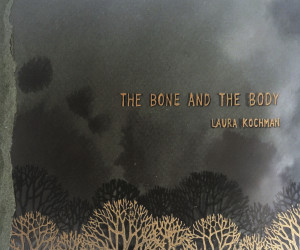 Book Title, Press, Year of Publication:
Book Title, Press, Year of Publication:
The Bone and the Body, BatCat Press, 2015
Synopsis: Poems from a speaker whose problem is embodiment, who begins by writing letters with no answer and then begins to speak into that silence—while, you know, at the beach, the slipperiest of places to find concrete answers.
What do you think makes your book (or any book) a “project book”?
I think it can be a bit difficult to pin down, but: I think of a project book as one that works holistically, that is better read all together than separated into its parts. It doesn’t necessarily need a constraint or a pattern, though it may have those qualities, but for me is more specifically defined by its sense of un-forced togetherness. I’m a sucker for this kind of book because I prefer to read poetry books all in one sitting, and because I enjoy working through an idea over a longer span of time—whether long poem, chapbook, full-length. The Bone and the Body has a table of contents, and much of it has been published in journals as individual poems, but I think of the book as one long poem, one long body. For me, the question of embodiment that the speaker just can’t seem to figure out is also a question about reading and texts and wholeness. Maybe this is also a question about project books.
Why this subject (or constraint)?
I started writing this poem because I discovered this strange voice and her strange surroundings, and I wanted her to continue speaking. I had written a few scattered poems about the woman in the woods, who receives a lot of the letters in the book, but then I became more interested in this other person, the one who was always being kept at a distance, unsatisfied. It was like I was following her around, picking up her letters. I also have a long personal history with the beach, and with longing, and with a particular house that, at the time I was writing, was shifting ownership and then—almost as though predicted in The Bone and the Body—was hit by a hurricane and filled with sand and torn down. I will never go back there. But for me it is both personal and philosophical—I am personally concerned with silence, with stuck-ness, with embodiment, and philosophically I just can’t get over these things, either. How weird, ridiculous, impossible, fitting, to be a mind existing inside a body. When you are thinking internally—which is all the time—do you feel limited? No, you feel pretty much like you have always existed and you always will exist, because to yourself you always have. The totality of who you are as a person is held in check by your impossible body. That is a project book.
How important was it for you that each poem could “stand on its own” or that the poems should rely on other poems in the book, or on the premise of the project itself, to succeed? What challenges did this present for you when writing single poems or structuring the book overall?
I was told that it was important that each poem could stand on its own, and I did try at first, but it became obvious to me that I couldn’t write the kind of book I wanted to write if I stuck to that attitude. And I got a lot of journal rejections that went something like, “We liked these a lot! But we really think they’d work best all together / in a larger context / as a book-length manuscript.” I didn’t think of the book as a book-length poem for a while because of this insistence in the poetry world on “poems that stand on their own”—again the text as a kind of human form, walking around—and it wasn’t until I did that I figured out the prose and verse pieces needed to interlock, and that it was okay not to move chronologically. The verse pages in The Bone and the Body especially don’t stand on their own, which is kind of fitting, as a speech act relies on a body to carry it.
Did you ever lose momentum, bore yourself, or worry that your project could not be sustained for a full-length book? How did you push through?
Whenever I’m working on something that I think might spin out longer than a single poem, I always worry that it can’t be sustained. Sometimes I’m right, and it ends up shorter than I expected, and that’s fine. I recently wrote a re-installation of a lost artwork that I initially thought would be a whole book, but it turned out to end at 30 pages, which was where it felt right to end it. Thirty pages is just a different kind of book than the contest-required 48-page minimum.
When I was working on The Bone and the Body, I started with the letters and kept going as the speaker and the landscape evolved. It felt very natural. Unlike the speaker, I did not feel stuck. But then I hit a point where it felt like something was breaking, like things just couldn’t go on as they were. It felt like something had to change, which felt like a move toward narrative, which scared me. I happened to be taking a class on classical literature at the time, reading Homer and Virgil and Ovid, as well as reading Alice Notley’s The Descent of Alette on repeat. I thought a lot about epic poetry and acts of speech and movement and the hero’s journey (and the role of the horse in classical, epic poetry, although that’s a little unrelated). I was afraid to write a book-length poem. I was already writing a book-length poem. How could I represent action in a text, which, by its nature, takes place after the action? How could I manipulate time and space to move my book into the present moment? For once, like my speaker, I did not know how to go on, so I forced her to speak, and she began to stutter.
As you were writing, were you influenced by your experience or perception of how project books are received by readers and editors (either positively or negatively)? Do you feel differently about your book being defined as a “project book” now that it has been published than you did when you were writing it?
Yes. I have thought about this a lot. I’m not ignorant of complaints about the project book phenomenon, or accusations that it’s caused by an excess of MFA writers who write project books because they need something to keep them going. I’ve read books that were trying to be project books that I really disliked—they did seem to need a driving principle, and felt forced. The most recent book I’ve written was actually a challenge to myself to not write a project book. I had to do all of the things in writing that scared me, including writing poem by poem without necessarily understanding my purpose. It turned out to be the book version of how I write, which is to say word by word, without necessarily understanding my purpose. I was afraid it wouldn’t stick together, but a mentor insisted that if you write a book of discrete poems around the same time, they will always stick together, because they all came from your singular brain. He was totally right. In a certain light, I’d say that that book is just as much a project book as The Bone and the Body, though without as obvious of a consistent framework.
Now that The Bone and the Body is published, I feel a little anxious about being lumped in with those project books that are trying too hard. But I’m grateful, for that reason, for this space to talk about it.
As a reader, are you drawn to project books? What project books have influenced you or have you enjoyed, and what do you think makes those books successful?
Yes, absolutely. I like to experience writing as a thing that holds me together. I like to get caught up in it and let my brain do the work behind the scenes. I like to feel, as a reader, as though the moment of reading/understanding was the point all along.
Glass, Irony, & God, Anne Carson
Neighbor, Rachel Levitsky
Tsim Tsum, Sabrina Orah Mark
Mule, Shane McCrae
The Descent of Alette, Alice Notley
Dance Dance Revolution, Cathy Park Hong
Ours, Cole Swensen
Black-Eyed Heifer, Shelly Taylor
That’s an extremely partial list. These books are pretty varied, but in my memory they are all defined by a sense of care. It’s obvious in the writing that these books meant something important to these writers. They are both personal and philosophical, hyper-specific and yet open as a field of meaning.
What advice can you offer other writers, particularly emerging writers or poetry students who may be using the project book as a guiding principle for their own work?
Write a project book if you have to. Don’t do it if you feel like you’re supposed to. Write a book that is its own all-in-one only if there isn’t any other way to do it. Do it because you need the room. Keep asking yourself why and, in general, follow your sense of need.


